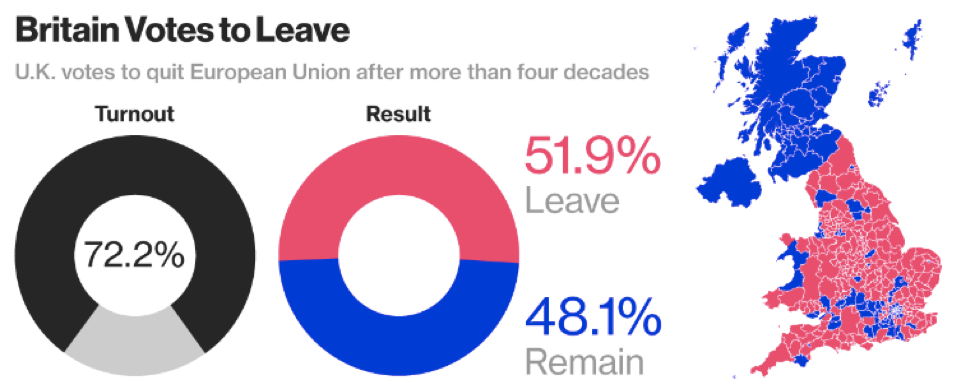Citizens of the United Kingdom voted on June 24th to exit the European Union (EU). This significant decision sets up a wave of uncertainties around UK, other EU member countries, and ultimately the world economy. Observers are speculating and debating about the path forward and unsure about the complete fallout, ramifications and timing.
Source: Bloomberg, 2016 06 24
Prime Minister David Cameron immediately announced his resignation and will step down in October. The British Sterling crashed to a level not seen since 1985 against the U.S. Dollar as other safe haven currencies of Japan Yen and Swiss Franc and gold soared. Investor flight to safety has also pushed government bond yields significantly lower. Global stock markets lost more than $2tn in equity value in a single day. These reaction functions are expected as the world immediately adjusted to the new reality. Unfortunately, this is not just about Brexit, but an acceptance of more institutional and EU risk to come. Brexit is only the tip of the iceberg of dis-unification. The short-term threat is the possible breakup of the United Kingdom. Scottish First Minister Nicola Sturgeon announced that her government is working on legislation for a new independence referendum and other alternatives as Scotland has always wanted to operate as a member of the EU. Then there is the Spanish legislative election on June 26th. The last election on December 2015 failed to give an outright majority to any party. The anti- austerity Pedemos party and the left-wing party of United Left could become the majority. This would be another blow to the establishment. More to come are the April 2017 French election, August 2017 German election, and Feb 2018 Italian election. These are all opportunities for fringe and anti-establishment parties to gain control for the dis-unification of the EU.
Brexit is a vote about the uneven participation in economic recovery and prosperity since the Financial Crisis; the seemingly unstoppable waves of immigrants competing for dwindling resources, benefits and jobs; and the push back against the status quo, the establishment and the elites who are deemed to be disconnected from the electorate. The vote is a pronouncement of discontentment and frustration with the status quo and the downside effects of globalization and free trade. At the end, this is about collective fear viewed from the lens of scarcity after years of anemic economic growth, disinflation and policies. In a world where a country-state’s boarder cannot be limited by physical boundaries and labor, industry, productivity and finance are fluid and cross-national, citizens and politicians feel vulnerable. This is exacerbated by the run up to the Financial Crisis where financial leverage and engineering made average citizen feel more financially comfortable and economically empowered. In reality we brought forward the growth and returns of the future. Then came the Financial Crisis which exposed the weaknesses of our global financial system and the house of cards by which many have laid their foundations and expectations about the future.
Brexit is simply the latest manifestation of discontentment with the status quo and finger pointing. Not unlike the twin promises of change and hope that swept Mr. Barack Obama into office in the U.S. almost 8 years ago, Britain is going through its version of change and hope. Populism is a powerful politics when segments of the population believe that they have been wronged and their interests disregarded. High tide has not lifted all boats and the push back and reversal of trade and free market capitalism is an understandable but wrong path forward. This is a case of bad economics driving bad politics. Unfortunately, economic growth is the elixir that is nowhere to be found.
